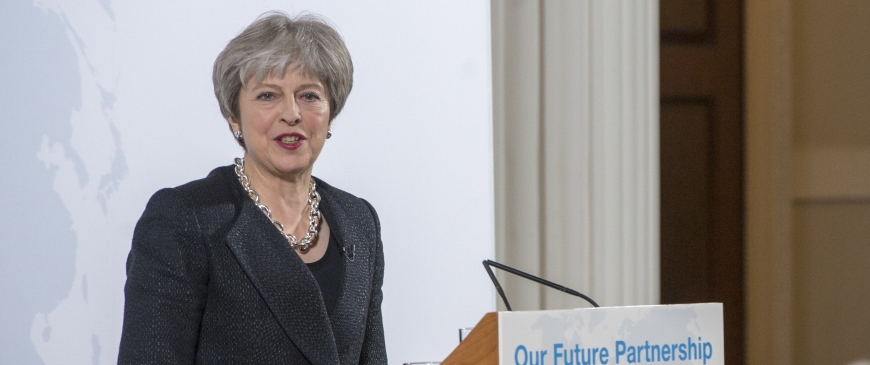
Theresa's Irish trilemma
Theresa May must soon deal with an invidious trilemma. She can only choose two of three options: leaving the single market and customs union, maintaining a border-free Ireland, and pursuing a whole-UK approach to Brexit.
The first two options she could pick are for Great Britain to leave the single market and customs union, while Northern Ireland would remain inside the EU’s customs union and continue to sign up to EU rules covering agriculture, goods and valueadded tax, among other things needed to maintain the ‘all-island economy’. This is one of the scenarios that the EU set out in detail in its draft withdrawal treaty, published in late February this year. It would entail different rules for Northern Ireland and the rest of the UK. The Democratic Unionist Party might withdraw its support for the Government if May agreed to the EU’s proposal. The Tory right could also revolt.
Alternatively, May could insist on taking all of the UK out of the single market and customs union and try to negotiate as soft a border as possible, using camera technology and online form-filling, a ‘trusted trader’ scheme and risk-based checks at lorry parks away from the border. This is the option that Boris Johnson prefers, judging by a letter to the Prime Minister that was leaked late last month. But it would violate the UK’s vow to avoid “any physical infrastructure or related checks and controls”. It is not apparent that Ireland and the rest of the EU-27 would accept that.
The Prime Minister’s final choice would be to perform the mother of all U-turns, and keep all of the UK in the single market and customs union, which would eliminate the need for a border. This would almost certainly result in a leadership challenge. In her March 2nd ‘Road to Brexit’ speech on the future relationship, May repeated her Government’s proposals on customs made in an options paper published last summer: use technology, and exempt small and medium sized businesses which conduct 80% of crossborder trade from customs procedures.
Checks to make sure goods crossing borders are up to code wouldn’t be necessary, because the EU and UK could recognise each other’s regulations and standards. In effect, she denied the existence of the Irish trilemma, claiming that technology, turning a blind eye to smuggling and comprehensive mutual recognition would alleviate the need for border infrastructure.
But it is very likely that the EU will only offer a limited free trade agreement, far from the broad partnership that May proposes. In the draft guidelines, published shortly after May’s speech, European Council officials reiterated the no cherry-picking mantra, saying that there should be no participation based on a “sector-by-sector approach”. They would aim for tariff and quota-free trade in goods, fisheries and agriculture, but said no to far-reaching mutual recognition. Finance went unmentioned, and trade in services would be determined by “host state rules”, meaning that the UK would have the same access to the EU’s services markets as any third country.
This tough approach should not be a surprise. The EU always defends its right to regulate, and May’s ideas would mean the EU accepting goods and services into its market that are not subject to EU rules. It also means that May’s Irish border headache will become more acute.
Taken together, the draft withdrawal treaty and the guidelines for the future relationship mean that either Ireland will have to accept border infrastructure, or that there will have to be a special status for Northern Ireland. In the guidelines, the Council said that the EU will insist on border checks to stop smuggling and VAT fraud, and to uphold EU standards. This means that a physical border will be needed between Britain and the EU-27. The European Commission has been at pains to say that if the UK can suggest ways in which technology or customs collaboration can prevent a border, it will be willing to listen. But it is sceptical.
May is being forced to pick two options in the Irish trilemma. So far, the signs are that the EU-27 will continue to back up Ireland, and press for a special status for Northern Ireland. They will argue this is the only way to reconcile the UK’s decision to leave the customs union and single market with the joint promise to avoid a so-called hard border. Given the DUP’s hostility to the idea – and that of Tory hardliners – resolving the Irish trilemma could lead to May’s downfall.
John Springford is deputy director of the Centre for European Reform.
